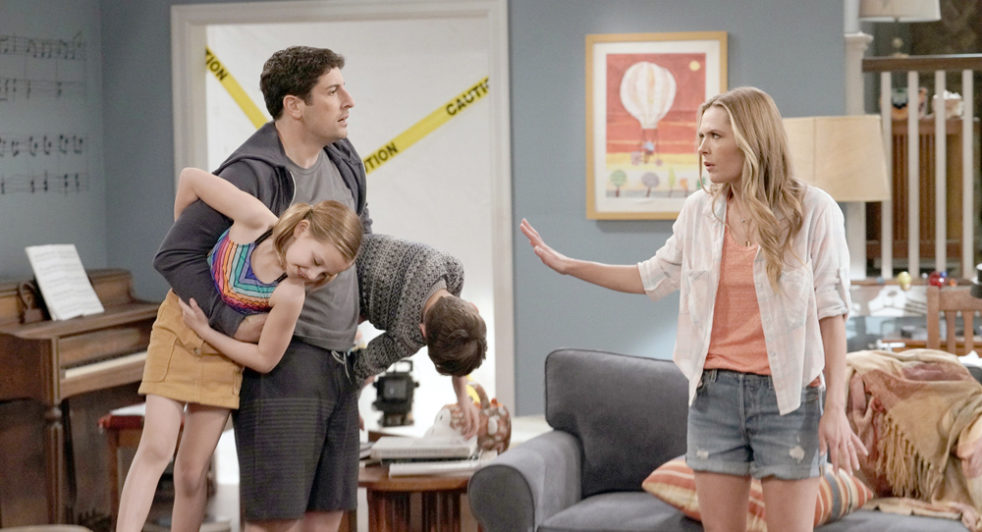Fox introduced its latest multiple camera sitcom on Jan. 23 when it premiered Lon Zimmet’s (“Unbreakable Kimmy Schmidt”) new series “Outmatched.”
The show stars Jason Biggs (“American Pie”) and Maggie Lawson (“Psych”) as Mike and Kay, the ordinary working-class South Jersey parents of three genius kids — and, for comedic effect, one ordinary one. Mike and Kay struggle to parent their hyper-competitive and precocious children — pre-teens Nicole (Ashley Boettcher, “Alone Together”) and Brian (Connor Kalopsis, “Days of Our Lives”) and the much younger Marc (Jack Stanton, “Copi and Cami Ask the World”).
Thanks to the gimmicky premise and unknown cast, the critical expectations for the series were low. Still, critical expectations are not the yardstick against which a sitcom is measured; virtually all successful multiple camera sitcoms — “Friends,” “That ‘70s Show,” “The Big Bang Theory” — had similarly humble beginnings.
Where “Outmatched” really comes up short is in its comedy. Despite Zimmet’s attempt at creating a premise that does all the work for the writers, the show is just not funny. The tone is set early, when the pilot opens with a conversation between Mike and Kay which is packed full of attempted jokes that fall completely flat. It would be difficult to even determine what the writers intend the audience to find funny if it were not for the rehearsed laughter of the live studio audience.
This continues throughout the pilot. There are a few jokes which prompt reserved chuckling, but the episode is almost entirely devoid of jokes that work at all, let alone ones that elicit gut-busting laughter. For many of the jokes, it is not an issue with the writing. Rather, the show suffers from chronic poor delivery and bad acting.
The blame for these poor performances should not fall on the actors. Excellent sitcom performances are not about being convincing, conveying genuine emotions or even perfect comedic delivery. While “Friends” found success with a more emotional and dramatic performance style, “That ‘70 Show” kept audiences engaged by not taking itself too seriously and “The Big Bang Theory” presented outlandish caricatures of familiar characters with an equally outlandish delivery style. The acting on these two less serious sitcoms is not superior to that in “Outmatched;” these shows simply had a clear direction and identity for the actors to structure their performance around, while “Outmatched” does not.
Some of the jokes are delivered in a realistic tone, as though they are actual jokes told between real human beings, a la the “Friends” style. Some are delivered in an unrealistic, performative tone, as in the almost fourth wall-breaking style of “That ‘70s Show.” The result is the feeling that the actors do not know exactly what they are supposed to be doing, a feeling that is uncomfortable for the audience and certainly not funny.
The show’s un-funniness and lack of identity is why it will never be a great sitcom. Still, there are plenty of not-great sitcoms that have survived long enough to make several moderately successful seasons. “Outmatched” is unlikely even to reach that level, for another reason entirely.
Sitcoms often stick around not because they are funny, but because viewers find them relatable and comforting. Most reasonably successful shows depict relatable characters encountering relatable challenges. This does not mean that a show cannot have an unusual premise, but there must be a kernel of realistic truth at the center. “The Big Bang Theory” features a group of brilliant and geeky scientists living in extremely unusual circumstances, but each character is an extreme version of a stereotype that viewers are familiar with. For all of its critical flaws — and there are many — “The Big Bang Theory” relates to audiences.
The premise of “Outmatched” lacks that kernel of truth at its center that keeps the show familiar for the viewer. As people, Mike and Kay are relatable characters, but their circumstances are not reflective of a reality that any viewers are likely to have lived through. Sure, there may be viewers who have raised or are raising children who are much more intelligent than them on paper, but in the everyday experience of raising those kids the viewer would not feel the same frustrations and encounter the same challenges that the characters do.
It is one thing to place characters in wacky situations for comedic effect, but it is another thing entirely for the show’s premise to be built around a conflict which feels foreign and unfamiliar to the viewer. The poor quality of the comedy does not help, but this flaw is ultimately why “Outmatched” will struggle to draw viewers. Fox’s new sitcom is the rare one that is neither funny nor relatable.
